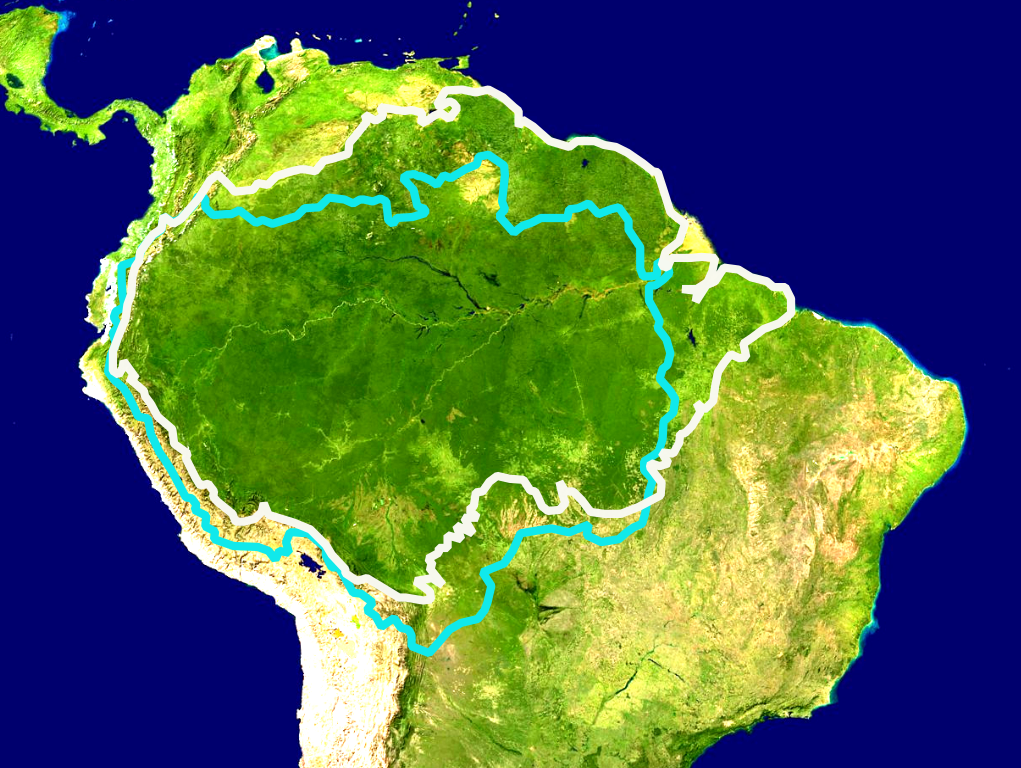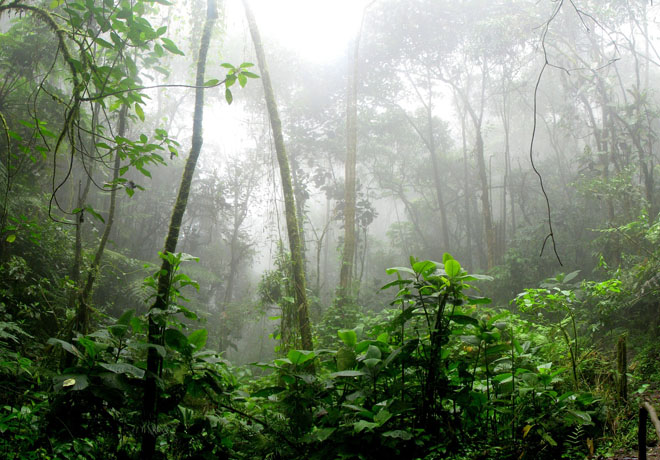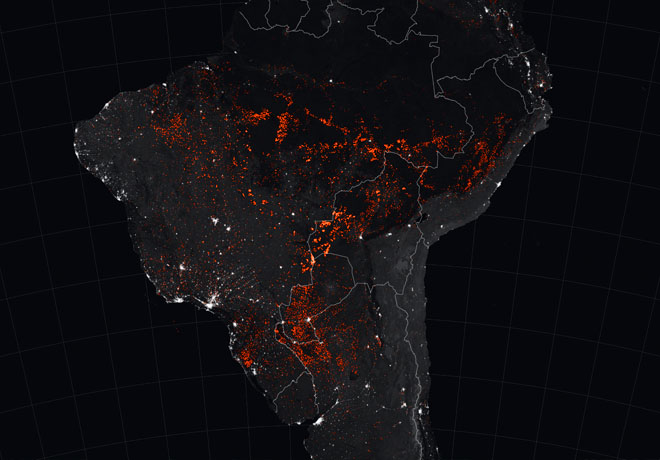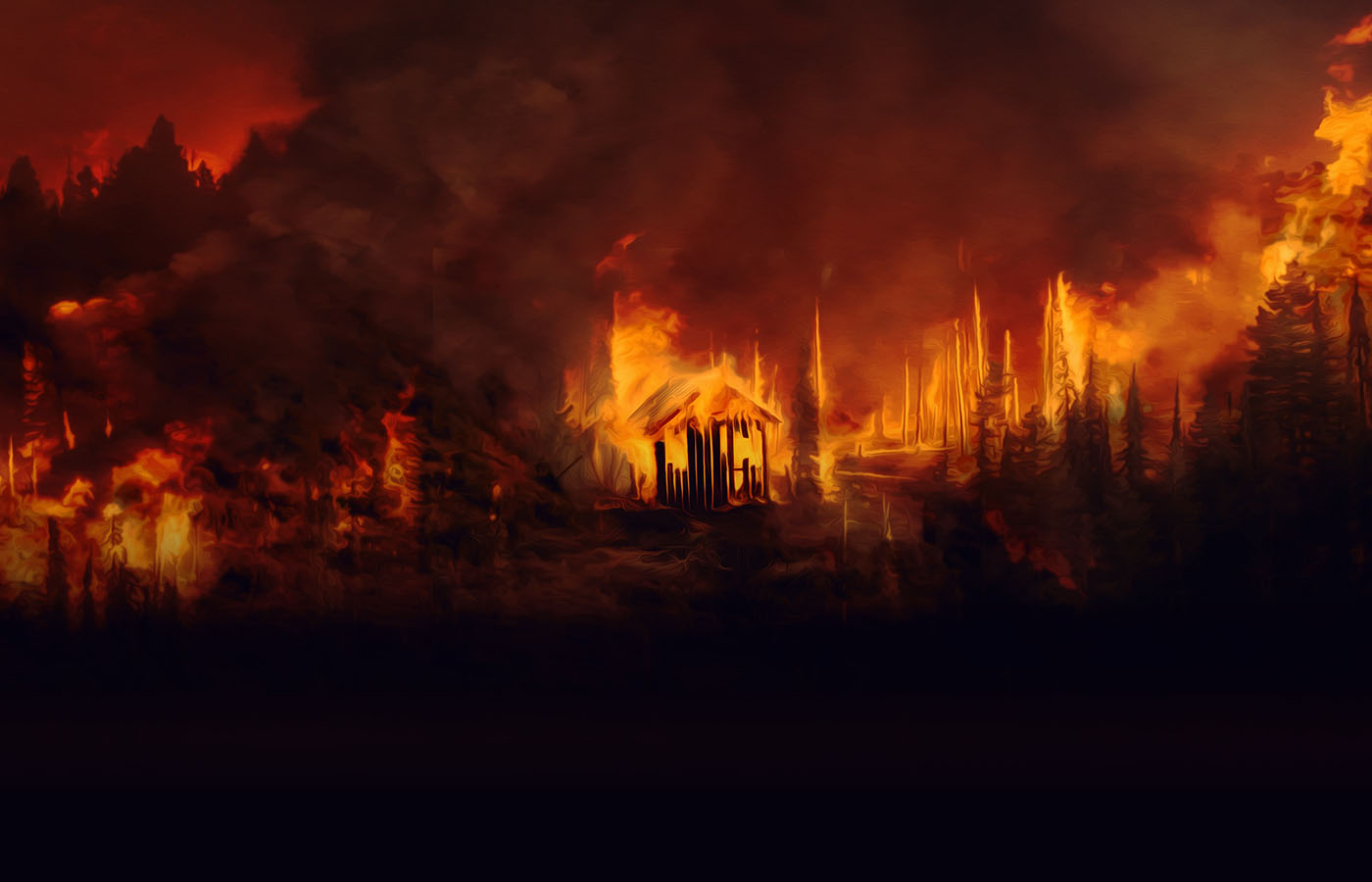To you, O Lord, I call. For fire has devoured the pastures of the wilderness, and flame has burned all the trees of the field. – Joel 1:19
The 2019 dry-season Amazon fires drew attention from political leaders and church organizations worldwide, not only because of their number and intensity, but also due to their worldwide environmental impact and the reaction of Brazilian and other government officials.
These still-burning Amazon fires are only a part of an extremely complex web of events related to an increasing planetary crisis.
Yet, these still-burning Amazon fires are only a part of an extremely complex web of events related to an increasing planetary crisis.[1] As such they raise important questions about an appropriate Christian response. This article addresses each of these issues: the fires themselves, their worldwide impact and significance, and worldwide and national government responses, as well as guidelines for a Christian response.
Figure 1: Outline map of the Amazon Biome (white outline) and Amazon Basin (light blue outline)

Copyright: Creative Commons, 6 March 2017
The Amazon fires
As the son, brother, and uncle of local firefighters, I was brought up with the dangers of fires. During my studies in southern California I witnessed firsthand the widespread effect fires can have in large areas, requiring the first response of firefighters from several neighboring States.
The Amazon basin is shared by 8 countries
10% of the world’s known biodiversity
4K miles of river account for 15-16% of the world’s total river discharge into the oceans
The toll of the Amazon fires is in an entirely different category because of the region’s sheer size and role in the world’s eco-stability:[2]
- It encompasses eight countries (Brazil, Bolivia, Peru, Ecuador, Colombia, Venezuela, Guyana, and Suriname) and the territory of French Guiana.
- The 6.7 million square kilometers of the Amazon biome is twice the size of India.
- It is the single largest remaining tropical forest, more than half of the planet’s remaining rainforest, and home of 10 percent of the world’s known biodiversity.
- Its 4,000 miles of river account for 15-16 percent of the world’s total river discharge into the oceans.[3]
Yet, since 1985, this immense and biologically diverse area has lost 17 percent of its forest canopy due primarily to annual fires set to clear forests for cattle grazing and farming (about three-quarters of the deforestation) and also to prepare previously cultivated lands for their next crops. When this loss reaches 20-25 percent, changes to the Amazon’s ecosystem will become irreversible, transforming the land into more savanna than forest, according to Carlos Nobre of the Brazilian Academy of Sciences.[4]
The fires in areas previously not cultivated are only the final steps in deforestation, as, first, trees are leveled and left to dry early in the year and then set ablaze months later to clear the land. By the first week of September, 2019, Brazil’s National Institute for Space Research (INPE) registered 100,000 fires throughout Brazil that year, the highest number since the organization began to keep records in 2013 and an increase of 43 percent over the same period of the previous year—and more than half were within the Amazon.

The Amazon stores 90-140 billion metric tons of carbon
The Amazon accounts for ¼ of the carbon dioxide absorbed by the world’s forests
Planetary impact
The environmental role that the Amazon plays is not only critical for regional climate patterns but also in the regulation of the earth’s climate. This is due to a number of complex and interrelated factors, two of which are well documented and recognized by the vast majority of the scientific community both in Brazil and worldwide:
- The Amazon already stores 90-140 billion metric tons of carbon. It accounts for a quarter of the carbon dioxide absorbed by the world’s forests. Deforestation, the ultimate goal of setting fires, releases up to 0.5 billion metric tons of carbon per year into the atmosphere, making a substantial contribution to global warming.
- Deforestation also diminishes the global cooling effect of the condensation this region produces (sometimes referred to as ‘atmospheric rivers’) that is carried through major trade winds to the Artic for further cooling.
So, burning and the consequential deforestation of the Amazon both substantially increase its capacity to warm the planet and decrease its capacity to cool it down.
National and worldwide response
The world reacted strongly to the fires. There were protests in many cities around the world as well as horror and dismay over Brazilian president Jair Bolsonaro’s environmental policies and his nationalistic UN speech in September. In August, following international pressure at the G7 summit and over the pending EU-Mercosur free trade agreement, he sent 44,000 troops to help fight the fires and ordered a 60-day ban on setting new fires to clear land.
The number of fires then dropped to a third of the level of the previous two months. Nevertheless, the larger challenge is deforestation; according to data from Brazil’s National Institute for Space Research (INPE) in November, 3,769 square miles of Brazilian Amazonian rainforest were lost in the twelve months ending July 2019, the highest rate of deforestation since 2008 and nearly 30 percent more than the preceding twelve months.
Christian organizations also last year publicly expressed deep concern for the preservation and reintegration of the Amazon rainforest:
- Evangelical environmental groups such as A Rocha Brazil and Renew Our World, along with the interfaith initiative Faith for the Climate, held meetings and spoke out through their social platforms against the fires.
- The National Council of Christian Churches in Brazil,[5] the Roman Catholic Synod of Bishops for the Pan-Amazon Region (bishops from nine nations within Amazonia),[6] the Anglican Communion, the Evangelical Alliance of Churches in Brazil,[7] the National Evangelical Network of Social Action in Brazil, and the Ecumenical Forum ACT in Brazil,[8] as well as Christian organizations around the world such as Christian Aid in the UK,[9] the World Council of Churches,[10] the World Communion of Reformed Churches,[11] all produced and published statements denouncing government policies of ‘development’ in the region and calling for government action to stop illegal burning and deforestation.
However, there are two contrary reactions to the fires, representing an ideological war that undergirds this whole conversation:
- On one side are those who defend a sustainable planet for the future survival of human civilization (backed by a rigorous scientific community widely recognized as 97 percent consensual).
- On the other side is a whole sector with an increasing political voice that, in the name of progress, order and economic development, defends the right of exploration of natural resources with as little governmental regulation as possible.
The clash is no less prevalent within the Christian community, deeply complicating the possibility of a united Christian response. Still, some biblical guidelines must be sought.

Amazon fire satellite image from NASA Earth Observatory
A Christian response
The Amazon fires raise critical issues concerning the fundamental well-being and future of our planet. Obviously, a Christian response would have to include eschatology—and for that reason alone is probably more often avoided. However, regardless of one’s eschatological views, there are perspectives that need consideration. I suggest the following as a brief outline:
1. Creation care fundamentally defines our very humanity, Christian or otherwise.
Creation and new creation are both the beginning and the conclusion of the biblical drama and as such require greater attention in Christian teaching than is common. Our very humanity is defined precisely by the mission of caring for God’s creation (Gen. 1:26-28; 2:15), a mission that remained even after the Fall (Gen. 9). That is even more so for God’s people to whom an anguished creation looks for its very redemption (Rom. 8:18-25). As followers of Jesus we emulate his earthly mission of proclamation, teaching and healing, demonstrating concretely our love of God through love of our neighbor (Luke 10:25-37); we thereby fulfill the evangelistic commission to make disciples all over the world and teach them to obey all that Jesus commanded.
2. Creation care is not only a consequence of faithful Christian discipleship on a personal level, but is also part of the mission of the church.
Just as we follow Jesus as his disciples in his earthly example, we continue to follow him in his current and cosmic mission to ‘unite all things in him…’ (Eph. 1:10), including through the ministry of the church (Eph. 1:22-23; 3:10). Also, as new creations we are given the ministry of reconciliation (2 Cor. 5:17-18), just as Christ is reconciling all things in heaven and earth to himself through his sacrifice on the cross (Col. 1:19-23).
3. Climate change is at the center of attention within the scientific community working on the current planetary crisis.
As followers of Jesus who are ‘transformed by the renewal of your mind’ (Rom. 12:2), we can hardly maintain an antagonistic stance towards good science. This is especially true when the consensus is so widespread among the nearly 200 top scientists who comprise the Intergovernmental Panel for Climate Change of the United Nations, many of whom are committed Christians. At least four independent polls have concluded that 97 percent of the scientific community is in accord concerning the basic planetary crisis due to climate warming.
4. The care of creation, especially over the last few decades, has reached a critical point in the history of all human civilization in both speed and intensity and so requires the response of the church, first, as ambassadors of God’s justice and compassion, but also as an opportunity for world evangelization.
We care for creation because it is God’s creation and delight; and in Scripture we learn that God’s sense of righting wrong is as all-encompassing as his creation. As victims of climate change increase greatly (the United Nations estimates there will be anything from 25 million to one billion environmental migrants by 2050),[12] Christians must be ready for Good Samaritan responses.[13]
The single most strategic action is the mobilization of local churches and Christian organizations to plant trees.
Concrete Action
The single most strategic action to resolve the long-term effects of the Amazonian fires and deforestation is the mobilization of local churches and Christian organizations to plant trees. Nearly half of the world’s trees have been destroyed since the start of human civilization. Reforestation is the top climate change solution advocated by most scientists and the United Nations, along with programs to reduce emission of carbon and the preservation of current forests. Worldwide, approximately one trillion trees need to be planted, representing an area about the size of the US. While that number seems astounding, there is enough available uncultivated land in the world to meet that demand. Churches and Christian organizations can play their part in pilot programs and promote commercial and government initiatives at local and international levels to do the same.[14]
Suggested further reading:
Brown, Edward R. Our Father’s World, Mobilizing the Church to Care for Creation. Downers Grove: IVP Books, 2008.
Moo, Douglas J. and Jonathan A. Moo. Creation Care: A Biblical Theology of the Natural World. Grand Rapids: Zondervan, 2018.
Stam, Juan. The good news of creation. Oxford: Regnum Books, forthcoming.
Snyder, Howard with Joel Scandrett. Salvation Means Creation Healed: The Ecology of Sin and Grace. Overcoming the Divorce Between Earth and Heaven. Eugene, OR: Cascade, 2011.
Endnotes
- Editor’s Note: See article by Ed Brown, entitled, ‘Climate Change after Paris: What it means for the evangelical church’, in May 2016 issue of Lausanne Global Analysis https://lausanne.org/content/lga/2016-05/climate-change-after-paris.
- See https://towardsdatascience.com/an-analysis-of-amazonian-forest-fires-8facca63ba69
- ‘Inside the Amazon’ in http://wwf.panda.org/knowledge_hub/where_we_work/amazon/about_the_amazon/
- ‘Why fires that scorched the Amazon are a planetary emergency’. By Snigdha Das, 30 September, 2019. https://www.downtoearth.org.in/news/natural-disasters/why-fires-that-scorched-the-amazon-are-a-planetary-emergency-66982.
- See https://conic.org.br/portal/noticias/3220-movimento-ecumenico-manifesta-preocupacao-com-explosao-de-queimadas-na-amazonia
- See http://www.sinodoamazonico.va/content/sinodoamazonico/en.html
- See https://www.facebook.com/aliancaevangelicabrasileira/posts/2377140742404731
- See https://religionnews.com/2019/08/28/amazon-fires-deepen-a-split-between-brazils-evangelicals-and-their-fellow-christians/
- See https://www.theguardian.com/global-development/2019/sep/06/amazon-fires-shameful-indictment-of-our-lust-for-excess
- See https://www.oikoumene.org/en/press-centre/news/church-leaders-amazons-fire-must-be-addressed-as-an-international-crisis
- See https://wcrc.ch/?s=amazon
- See https://www.climateforesight.eu/migrations/environmental-migrants-up-to-1-billion-by-2050/
- Editor’s Note: See article by Ken Gnanakan and Atul Aghamkar, entitled, ‘India’s Water Crisis: How the church can be part of the solution’, in March 2018 issue of Lausanne Global Analysis https://lausanne.org/content/lga/2018-03/indias-water-crisis
- See https://www.theguardian.com/environment/2019/jul/04/planting-billions-trees-best-tackle-climate-crisis-scientists-canopy-emissions
